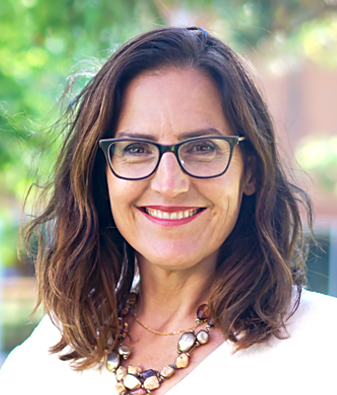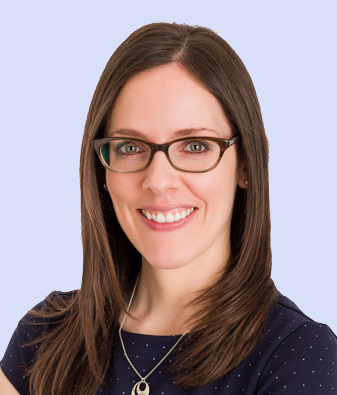With the help of a new program created by the Arts & Science Office of Experiential Learning & Outreach Support (ELOS), Andrea Williams is finally designing a course with an experiential learning (EL) component.
“I’ve long been interested in experiential learning,” says Williams, the director of Innis College’s Writing & Rhetoric Program, an associate professor, teaching stream and the director of the Arts & Science Writing-Integrated Teaching (WIT) program.
“In my field of writing studies, it’s a natural fit because the best way for students to learn how to write is to give them authentic audiences beyond just their professor or TA.”

Williams is part of the first cohort of seven faculty taking part in the new Experiential Learning Faculty Fellows Program — a pilot program supported by the Provost’s Experiential Learning University Fund that’s designed to assist faculty in embedding experiential learning into their courses.
“Developing a partnered EL course can be quite demanding,” says Colin McMahon, associate director, curricular experiential learning. “It requires considerable effort, advance planning, and engagement with external partners. The goal for the program is to support faculty who are keen on experiential learning and would benefit from having structured supports and a community around them as they design and deliver an EL course.”
Participating fellows have either created a new course with EL, or they’re adding an EL component into an existing course. They are expected to commit to creating or adapting a course in year one, and then offer the course for at least another two years, and hopefully for years to come.
Support for this program comes in many forms — course and assignment design; workshops; funding support; a retreat; one-on-one consultations; and helping faculty establish internal or external partnerships that are pivotal for engaging EL experiences.
“Some faculty want a lot of support developing partnerships, some want to do it in a 50-50 type of way, and some are fine doing it on their own,” says Danielle Moed, an ELOS experiential learning coordinator who helped create the program.
Having a real live audience for whom students are writing is so much more authentic, especially with writing that's going to have a social impact by improving an organization’s outreach, increasing people's access to nature, or raising consciousness about the environment.
“In some courses, there's just one partner and in other courses, we might have to find 10 or more. When we're in discussions with the professors, we try and learn as much we can about their desired learning outcomes before we find a partner or partners for them.”
Williams plans to add an EL component to a Writing for Social Change, a course that she will teach next fall. She intends on partnering with one or more environmental organizations and envisions assignments with her students working directly with these groups to generate impactful writing.
“Having a real live audience for whom students are writing is so much more authentic, especially with writing that's going to have a social impact by improving an organization’s outreach, increasing people's access to nature, or raising consciousness about the environment,” says Williams.
“But the prospect of finding appropriate community partners, figuring out how to integrate it in a way that was exciting and interesting for students was overwhelming for me,” she says. “So the fellowship is helping me do this, and really supporting me as I redesign this course.”
It’s just something I really wanted to do, and the fellowship has been fantastic, it’s done exactly what I needed. I always felt like it would be a great addition to our psychology curriculum to have a community-engaged learning course.

Ashley Waggoner Denton, an associate professor, teaching stream in the Department of Psychology, is also part of the first group of fellows and was eager to design a new fourth-year community-engaged learning course.
“It’s just something I really wanted to do, and the fellowship has been fantastic, it’s done exactly what I needed,” says Waggoner Denton. “I always felt like it would be a great addition to our psychology curriculum to have a community-engaged learning course.
“These sessions have helped me focus on learning outcomes, on getting different ideas for assessment, and the different types of assignments that I might use in my course.”
What drew Waggoner Denton to this model of community engaged learning is the emphasis on reciprocal partnerships between the students and external partners — in her case, a non-profit or grassroots community advocacy organization.
“The students are going to be able to apply their knowledge and develop skills outside of the classroom, while also benefiting that community partner,” she says.
Both Williams and Waggoner Denton have also enjoyed discussing their future courses with the other fellows, finding their input along with the ELOS support invaluable.
“I feel like I’m co-designing the course because I’ve been receiving feedback from not only the Experiential Learning team, but also from my faculty colleagues,” says Williams.
“As I develop assignments and select readings, we’re having these wonderful conversations and giving and receiving feedback. Normally when you develop a course, you’re doing it alone. With this close group, we’re all at the same stage of going through the course design so I can tap into six other people’s minds, which has really improved the quality of my course.”
Waggoner Denton has benefitted from “being able to chat with people like Andrea and the other fellows, and just learning from more experienced faculty who have tons of experience doing community engaged, or experiential learning.”
For McMahon and Moed, seeing the fellows build a sense of community is an integral part of the program’s success and promotion — and they couldn’t be happier.
“We imagine these fellows will become advocates and champions of EL in their own academic units which is a really effective way of spreading the word rather than us just doing presentations,” says McMahon. “It’s a creative way of seeding experiential learning across the Faculty.”
The call for applications next year’s cohort for the Experiential Learning Faculty Fellows Program opens January 27, 2023.

